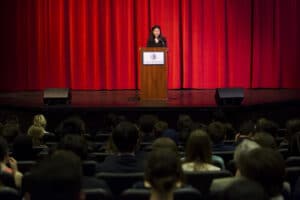Monday Convocation | Ying Ma
April 21, 2017

A native of China, Ying Ma discussed her upbringing in the US and her recent work for Dr. Ben Carson and President Donald Trump.
Ying Ma spoke to a Cate School audience on the night of Monday, April 17. Her credentials– 2016 Deputy Policy and Communications Director for Dr. Ben Carson’s presidential campaign, followed by a stint as the Deputy Director for a Super-PAC for Donald Trump—were juxtaposed against the background of Ma’s story. She characterized her life as “getting to know freedom and learning to overcome hate,” experiences that led her to be a conservative voice in politics.
Born in post-Mao communist China, Ma’s childhood was marked by privation: no hot water, no toilets, no refrigerator, washer, dryer, or color TV and above all, no economic opportunities. When her parents had a chance to immigrate legally to the United States to join family, they seized the possibility. Landing in Oakland for junior high and high school, Ma was subject to intense bullying, especially due to her race and gender. However, she excelled in school, gaining a place for herself first at Cornell, then at Stanford’s law school.
Ma was quite clear that she has never asked for special quotas or preferences or asked the government to do more for her because she had less than others. As she noted, “We fought poverty the old-fashioned way. We worked.” Ma was direct in her message to Cate students: inequalities exist in a free society. For Ma, the idea that everyone should have the same led to the poverty and hardships of her Chinese childhood. She stands as her own example of the power of hard work and personal responsibility to lead to economic opportunity and success. Her summary: “The path to success is not paved with grievances.” She offers her story to illustrate the virtues of America being available to any and everyone willing to work for them.
Ma invited questions after her speech, and many students were eager to speak. “As a person who emigrated from an oppressive regime to find a better life,” asked senior Lillian Perlmutter, “Why do you support a president who does not support immigration? Ma calmly reiterated her support for Trump as in part due to her support for a president who takes Homeland Security seriously. She also noted that when Ben Carson spoke to Syrian refugees, their priority was to go home, not to go to America. Sophomore Tilly Bates expanded upon the topic when she asked whether Ma believed that the chance of terrorist activity was worth enacting a racist ban. Detailing a more nuanced definition of Trump’s travel ban, Ma said that it is not correct to accuse everyone who is interested in fighting extremist terrorism as Islamophobe.
Moving back to the story of Ma’s childhood, Senior Musa Hakim asked Ma to expand upon a comment about minority hatred for other minorities. Ma is hopeful; she believes that if mainstream society and adults do not condone racial slurs, the hearts and minds of the young can be changed. Freshman Mark Huerta asked to what Ma attributed the “bad” school of her youth. Ma clearly called out lack of personal responsibility both of the students who would not study and of the teachers who would not teach.
The response from some Cate students indicated that they listened to Ma’s views but also wanted more detail. Avalon Swanson ’19 would have liked to hear about how Ma made the adjustment between her public school in Oakland and Cornell, while another student wondered about the inner workings of the Carson campaign. Joel Revo, ’17 noted that his fellow students’ questions sometimes were more oriented to poking holes in Ma’s comments than in actually starting a dialog.
By presenting speakers with a variety of opinions, both liberal and conservative, the School invites Cate students to think critically. Head of School Ben Williams noted that Cate is not here to make students comfortable. Instead, the School is here to help students learn how to look at the world outside of themselves and try to make sense of it. Surely the spectrum of ideas and opinions laid out in the Convocation series is a compelling way to encourage intellectual growth.